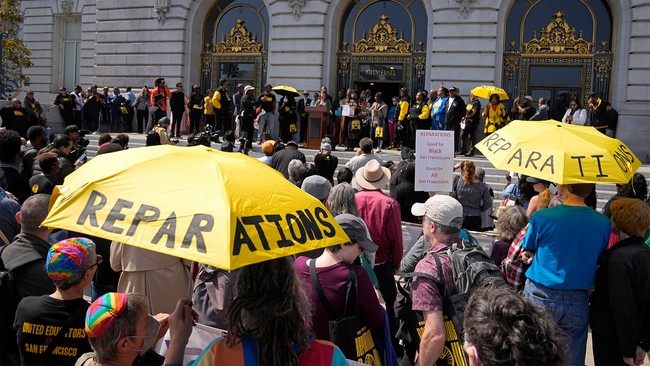This piece examines actor Roy Wood Jr.’s remarks about tracing an ancestor sold into slavery, his comments about finding the modern-day descendants of those slave owners, and how that episode exposes the flaws in modern reparations talk and local reparations plans. It looks at the generational distance involved, the actor’s own words about searching for and judging descendants, and why treating people today as liable for ancestors’ actions is both unjust and legally risky. The article also highlights specific reparations proposals and considers how they could set dangerous precedents. Throughout, the tone questions the logic behind collective guilt and the push for financial remedies based on centuries-old events.
I keep seeing the Roy Wood Jr. clip because it hits a raw nerve. He popped up on a podcast talking about what Finding Your Roots uncovered in 2012: an ancestor who arrived from Africa in 1790 and a link to the family that purchased him as a slave. That discovery is heavy and personal, but what followed in Wood’s remarks turned the moment into something else. Rather than grief or historical curiosity alone, his comments took on a punitive edge aimed at descendants who live generations away.
Wood’s line landed hard: “If I wanted to today, I could find the White Wood descendants in southern Georgia and pull up on their f***ing house one day,” Wood said. Those words are blunt and threatening, and people should call them what they are. It is dangerous to celebrate the idea of hunting down living people because of their ancestors. The tension here is obvious: the past matters, but that does not justify turning citizens into targets for historical wrongs they did not commit.
Put some numbers on it. The ancestor arrived in 1790, which is about 235 years ago. If you use a 25-year generation, that puts this separation at roughly 9.4 generations. That’s almost ten iterations of life, choices, migration and social change between the original actors and anyone living today. Holding people morally or financially accountable across that gulf is a leap that breaks common-sense fairness. Most Americans — including those born long after slavery ended — never owned slaves and cannot be justly saddled with their supposed descendants’ obligations.
Actor Roy Wood Jr. says he found the descendants of the family that purchased the first slave of his bloodline, says he will "pull up on their f*cking house."
"I could find the white Wood descendants in southern Georgia and pull up on their f*cking house."
"I Zillow'd their… pic.twitter.com/Sb3vCHIzpn
— Collin Rugg (@CollinRugg) November 5, 2025
Then there is the tone of expectation in Wood’s other comment. He said, “They ain’t got no money, though. I Zillow’d their crib. They broke. That’s the thing we were talking about with slavery, man. It was a lot of white people fumbled…How you broke and you had slaves?” That line reveals what many resent: the hunt for a monetary payoff rather than a search for truth or reconciliation. The implication that descendants ought to possess wealth because of their ancestor’s actions fuels a transactional view of history where every grievance becomes a bill to be paid. That mindset drives reparations proposals that ask for cash, land and formal oversight mechanisms aimed at correcting generational harm.
Local plans already push radical fixes under the banner of repair, and they do so with big promises and legal gray areas. A recent set of recommendations aimed to “repair generations of harm experienced by Black residents across five key areas: criminal justice, education, housing, economic development, and health & wellness.” Those lines sound compassionate on the surface but contain teeth that could bite into legal property rules and equal protection principles. When policy starts defining relief by race and tying benefits to historical grievances, it risks creating fresh injustices while claiming to address old ones.
The report also said the recommendations intended to “repair generations of harm experienced by Black residents across five key areas: criminal justice, education, housing, economic development, and health & wellness.”
The Commission’s recommendations included “establishing a Black wealth-building fund, creating community land trusts, expanding access to culturally responsive healthcare, reimagining school curricula to reflect Black history, and transforming public safety systems. The recommendations also call for ongoing accountability through a permanent reparations oversight body.”
The economic development recommendations specifically call for establishing “business corridors with commercial space for Black-owned businesses and community services in close proximity to Black neighborhoods,” and creating a private fund that could “provide direct cash payments to individuals harmed by racial discrimination.”
Among the proposed educational reforms are an effort to recruit Black teachers and encourage Black students to enroll in Advanced Placement and other academically challenging programs, as well as “teaching inclusive, historically accurate, diverse education within schools.”
Those recommendations read like a wish list that blurs public policy and racial preference. Programs targeted exclusively by race raise constitutional red flags and create division rather than healing. Worse, they open the door to legal claims that could challenge private property norms or force transfers of wealth in ways that unsettle the rule of law. Everyone who cares about fairness should be wary of policies that institutionalize race-based benefits under the guise of redress.
This is not sympathy for minimizing the horrors of slavery. Acknowledging historical evil is different from endorsing charges against people two centuries removed from those crimes. Roy Wood Jr. was never a slave, and the people he name-checked were not the ones who decided history’s injustices. Turning today’s citizens into financial targets because of a family’s past sets a precedent that will come back to haunt anyone who values individual rights and legal consistency.
The broader lesson is plain: we can study history, memorialize victims and fix present inequities through neutral, race-blind policies that expand opportunity. We do not need to resort to guilt-by-association, private investigations or crowd-sourced shaming to make progress. If America wants real repair, it should focus on opportunity, education and the rule of law, not on converting historical wrongs into ongoing liability for people who had nothing to do with them.






